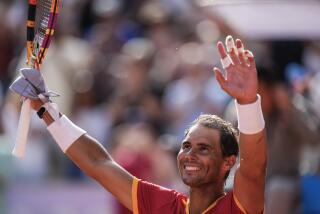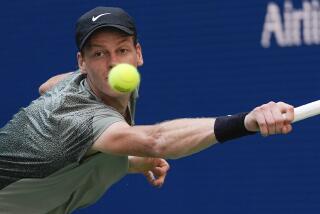Where Davis Cup Meets Ryder Cup
- Share via
Whether it is shorter sets, bigger balls, multicolored courts or courtside coaching, there seems to be no shortage of suggestions designed to invigorate the sport, giving tennis a hip jump-start in 2001.
Hip, naturally, is open to debate. Limp Bizkit on changeovers? Or by the time you hear the omnipresent “Who Let the Dogs Out” at a tennis match, the tune may be deemed “tired,” by cutting-edge standards.
(Conversely, if the Chicken shows up on any court, the sport is in deep trouble.)
The endeavor to appeal to new fans is not always easy. Too far, too fast, and fans are unsettled. One obvious example was the Davis Cup quarterfinal between the U.S. and the Czech Republic at the Forum in April.
Verdict on the Laker girls? One thumb down.
Verdict on loud, well-meaning public address announcer? Two thumbs down.
Many fans, and media, felt they had stumbled into a tractor pull, not a tennis match. Other entertainment elements were better received, and of course, the drama of the three-day quarterfinal prevailed in the end.
It was his first Davis Cup match on the job for Arlen Kantarian, who spent 10 years at Radio City Productions. Kantarian was hired by the USTA in February as chief executive of the U.S. Open and professional tennis.
“I think it was the beginnings of providing more of an entertainment aura to the tennis game itself,” he said of the Los Angeles match. “I think we just scratched the surface. There’s a much bigger picture at large.
“Sports and entertainment have clearly collided in the past couple of years, and I think many sports have caught on to that. And tennis has been a little later to catch on to that.
He agreed about perceived shortcomings at the Forum.
“You have to do it right,” Kantarian said. “We are never going to cross the line in tennis. It’s different from football, it’s different from the other sports. We’re not going to become a carnival. It has to be done with class, dignity and good taste.”
At Radio City, Kantarian started as executive vice president of marketing before becoming president and CEO. Previously, he was vice president of marketing for NFL Properties for six years.
One aspect making his job easier is that the controlling powers of tennis are eager to explore possibilities for change. Kantarian has been meeting with the leaders of the ATP, WTA, ITF and influential tournament directors, including Charlie Pasarell.
“Let’s pick the top three ideas instead of the 80 that are running around. And let’s do them properly and let’s do them together,” he said. “Easier said than done.”
Kantarian attended the Davis Cup semifinals between the U.S. and Spain at Santander in July and came away impressed. He is behind the effort to create a new format for the worldwide competition.
“I feel Davis Cup could be the single-most under-leveraged asset in sports and entertainment today,” he said. “That’s how strongly I feel. I’ve become very passionate about it in the short time I’ve been here. The color and the excitement--you don’t get it until you’re there.
“From a sports industry standpoint, we’ve all seen what’s happened with the Ryder Cup and other well-marketed international competitions. Everybody is talking about a better format for Davis Cup, that’s understandable, marketable and much more friendly with the three most important constituencies--the fans, the players and the media.”
MARAT MUSINGS
He goes through so many coaches--though fewer than the number of rackets he smashes--and now U.S. Open champion Marat Safin is back where he started 2000. He has reunited with his coach, Spaniard Rafael Mensua.
One thing hasn’t changed. He still likes smashing things.
“Sometimes you get angry,” Safin said. “You’re not going to hit yourself, right? So the racket is the closest thing. I’m so ashamed of the way I’ve been playing. Gaining confidence is so hard, losing it is so easy.”
He said that before Sunday’s final at St. Petersburg, Russia, where Safin managed to hit himself, turning an ordinary match against Dominik Hrbaty of Slovakia into a comic drama. Safin tossed his racket in the second set, hitting himself and necessitating an injury timeout when a piece of graphic splinter went into his arm.
And so his sixth title of 2000 came the hard, painful way.
“Sometimes breaking a racket helps,” Safin said. “You have to let out all the bad energy--you have to let it out somehow. And then you get calmer. It’s an injury I think I can live with. I said sorry to Dominik and everyone, and afterward we showed some good tennis. Also, I think a little drama in the final never hurts.”
Said Hrbaty: “He [Safin] said, ‘Sorry you have to wait.’ I said, ‘It was OK. You hurt yourself, not me.’ ”
AND FINALLY . . .
The 2001 season actually starts Dec. 30 with the Hopman Cup in Perth, Australia. There is a playoff between Japan and Belgium for a spot in the main draw, followed by a first-round match a day later between Switzerland and Thailand.
Representing the U.S. are Monica Seles and Jan-Michael Gambill. Defending champion South Africa returns with Amanda Coetzer and Wayne Ferreira, but the Swiss team of Martina Hingis and Roger Federer are considered the favorites.
More to Read
Go beyond the scoreboard
Get the latest on L.A.'s teams in the daily Sports Report newsletter.
You may occasionally receive promotional content from the Los Angeles Times.











